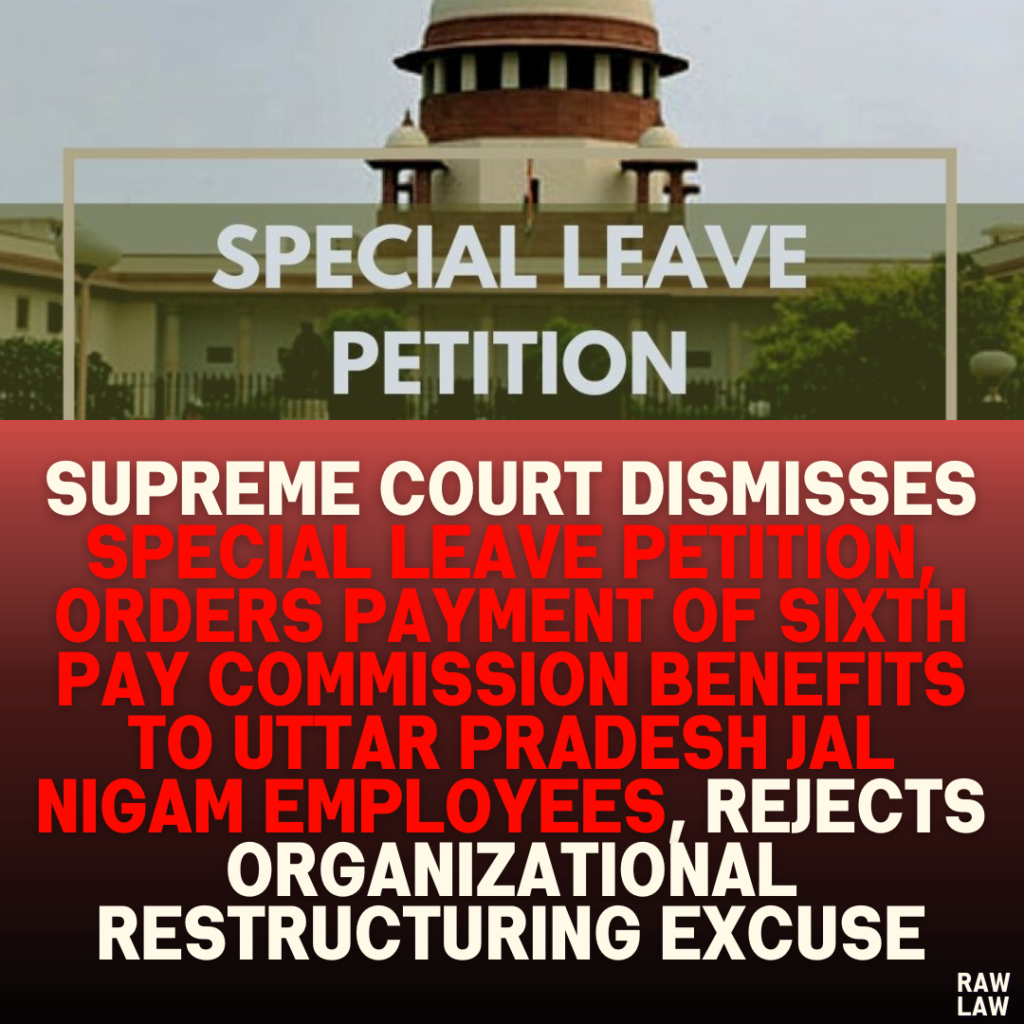Court’s Decision:
The Supreme Court dismissed the Special Leave Petition (SLP) filed by Namami Gange and Rural Water Supply Department, upholding the High Court’s decision that employees of Uttar Pradesh Jal Nigam are entitled to Sixth Pay Commission benefits from January 1, 2006. The Court granted three additional months for compliance with its earlier orders, warning that non-compliance would be treated as willful disobedience.
Facts:
- Background: The issue arose when employees of Uttar Pradesh Jal Nigam challenged orders denying them the benefit of Sixth Pay Commission recommendations from January 1, 2006, instead granting them only from March 12, 2010.
- High Court Orders: The Allahabad High Court, Lucknow Bench, quashed these orders and directed that employees be granted benefits from January 1, 2006, similar to State Government employees.
- Appeals Filed:
- The Uttar Pradesh Jal Nigam challenged this decision before the High Court’s Division Bench, which dismissed their appeal.
- The matter was then taken to the Supreme Court, where it was again dismissed. The Supreme Court directed payment of arrears within a specified period, failing which interest at 6% per annum would apply.
- Subsequent Non-Compliance: Despite clear directions, compliance was not achieved, leading to contempt applications in both the High Court and Supreme Court.
- Bifurcation of the Entity: The Uttar Pradesh Jal Nigam was bifurcated into two entities—Urban and Rural—in 2021. Namami Gange and Rural Water Supply Department, which emerged as a result of the bifurcation, filed the present petition, arguing that it was not responsible for the obligations arising before its formation.
Issues:
- Are employees of Uttar Pradesh Jal Nigam entitled to Sixth Pay Commission benefits from January 1, 2006?
- Does the bifurcation of Uttar Pradesh Jal Nigam into Urban and Rural divisions absolve the newly formed entities from complying with the earlier court orders?
Petitioner’s Arguments:
- Formation of New Entity: The petitioners argued that Namami Gange and Rural Water Supply Department was created in 2021 through the bifurcation of Uttar Pradesh Jal Nigam. They claimed that since the department did not exist at the time of the original orders, it should not bear the responsibility for compliance.
- Compliance Challenges: They requested more time for compliance, citing administrative difficulties following the organizational restructuring.
Respondent’s Arguments:
- Responsibility Unaffected by Bifurcation: The respondents maintained that the bifurcation of Uttar Pradesh Jal Nigam into Urban and Rural entities did not absolve them of their responsibility to comply with binding court orders.
- Finality of Judgment: The respondents argued that the Supreme Court’s earlier orders and the dismissal of review petitions clearly established the finality of the matter. Further delays or excuses were unacceptable.
Analysis of the Law:
- Finality of Judgments: The Supreme Court emphasized that once a judgment has attained finality, subsequent events, such as organizational bifurcation, do not impact the obligation to comply.
- Compliance with Court Orders: The Court stressed the principle that administrative challenges or structural changes cannot be used as a pretext to avoid compliance with judicial directives.
- Bifurcation Does Not Nullify Responsibilities: The bifurcation of Uttar Pradesh Jal Nigam did not create a new cause of action or excuse for non-compliance. Entities inheriting liabilities are required to adhere to pre-existing court orders.
Precedent Analysis:
- Earlier Orders of the Supreme Court (May 2022): The Court had ordered the payment of arrears within six months and specified that non-payment would attract interest at 6% per annum.
- Review Petitions: Multiple review petitions filed by the petitioners were dismissed, reinforcing the finality of the original decision.
- Contempt Proceedings: The Court had earlier warned that non-compliance would result in contempt action, showcasing the seriousness of adhering to its orders.
Court’s Reasoning:
- Repeated Non-Compliance: The Court noted that the petitioners repeatedly failed to comply with clear and unequivocal orders.
- Bifurcation Not a Valid Defense: The Court rejected the argument that bifurcation of Uttar Pradesh Jal Nigam excused compliance. It clarified:
“Once specific directions have been issued by this Court, the applicants are bound to comply with our earlier orders. Failure will be treated as willful disobedience.” - Grant of Additional Time: The Court reluctantly granted a further extension of three months for compliance, warning that any further delay would be viewed as willful disobedience.
Conclusion:
The Special Leave Petition was dismissed. The Court granted a three-month extension for compliance with its earlier orders. Contempt petitions filed against the petitioners were disposed of.
Implications:
- Accountability Post-Bifurcation: The judgment reinforces the principle that restructuring or bifurcation of an entity does not nullify its legal obligations under pre-existing court orders.
- Stringent Compliance with Court Orders: The case underscores the judiciary’s strict stance on ensuring compliance with its directives, irrespective of administrative or organizational challenges.
- Future Legal Precedents: This decision will serve as a precedent in similar cases where entities attempt to evade legal obligations due to structural or administrative changes.




Pingback: Supreme Court Differentiates Criminal Liability for Unauthorised and Authorised Agents in Railway Ticketing Fraud: Upholds Criminal Proceedings Against Unauthorised E-Ticket Seller While Quashing Charges Against Authorised Agent - Raw Law